英语四级语法用法辨析:wide与widely的用法区别.doc
英语-ly副词与其同源副词的用法比较 high highly close closely deep deeply wide widely
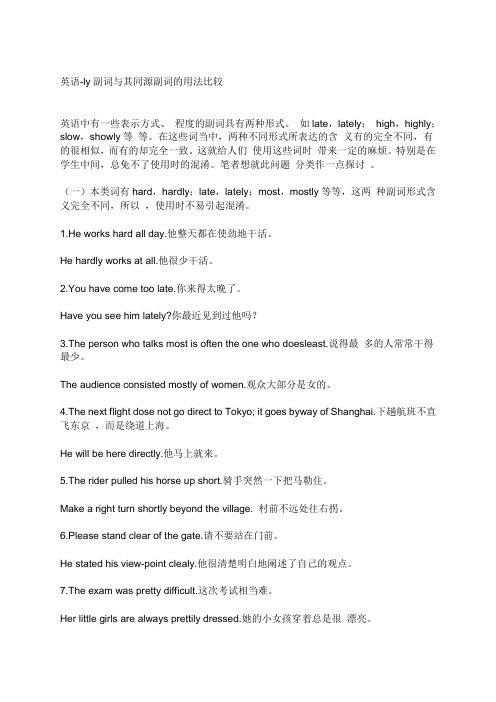
英语-ly副词与其同源副词的用法比较英语中有一些表示方式、程度的副词具有两种形式。
如late,lately;high,highly;slow,showly等等。
在这些词当中,两种不同形式所表达的含义有的完全不同,有的很相似,而有的却完全一致。
这就给人们使用这些词时带来一定的麻烦。
特别是在学生中间,总免不了使用时的混淆。
笔者想就此问题分类作一点探讨。
(一)本类词有hard,hardly;late,lately;most,mostly等等,这两种副词形式含义完全不同,所以,使用时不易引起混淆。
1.He works hard all day.他整天都在使劲地干活。
He hardly works at all.他很少干活。
2.You have come too late.你来得太晚了。
Have you see him lately?你最近见到过他吗?3.The person who talks most is often the one who doesleast.说得最多的人常常干得最少。
The audience consisted mostly of women.观众大部分是女的。
4.The next flight dose not go direct to Tokyo; it goes byway of Shanghai.下趟航班不直飞东京,而是绕道上海。
He will be here directly.他马上就来。
5.The rider pulled his horse up short.骑手突然一下把马勒住。
Make a right turn shortly beyond the village. 村前不远处往右拐。
6.Please stand clear of the gate.请不要站在门前。
He stated his view-point clealy.他很清楚明白地阐述了自己的观点。
7.The exam was pretty difficult.这次考试相当难。
wide与widely用法的三点区别
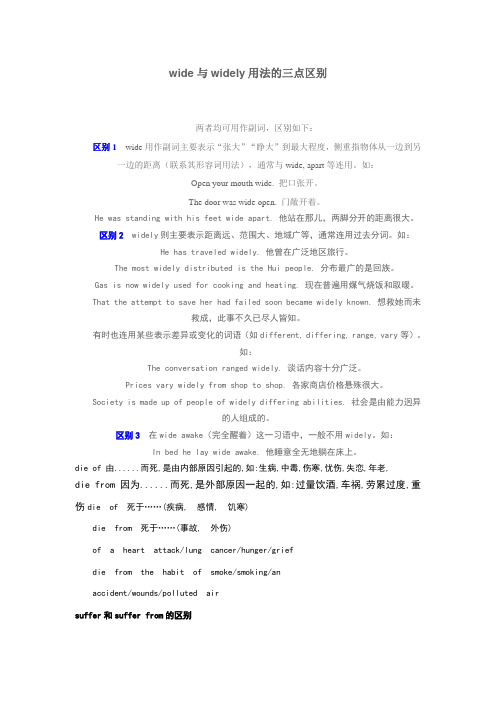
wide与widely用法的三点区别两者均可用作副词,区别如下:区别1 wide用作副词主要表示“张大”“睁大”到最大程度,侧重指物体从一边到另一边的距离(联系其形容词用法),通常与wide, apart等连用。
如:Open your mouth wide. 把口张开。
The door was wide open. 门敞开着。
He was standing with his feet wide apart. 他站在那儿,两脚分开的距离很大。
区别2 widely则主要表示距离远、范围大、地域广等,通常连用过去分词。
如:He has traveled widely. 他曾在广泛地区旅行。
The most widely distributed is the Hui people. 分布最广的是回族。
Gas is now widely used for cooking and heating. 现在普遍用煤气烧饭和取暖。
That the attempt to save her had failed soon became widely known. 想救她而未救成,此事不久已尽人皆知。
有时也连用某些表示差异或变化的词语(如different, differing, range, vary等)。
如:The conversation ranged widely. 谈话内容十分广泛。
Prices vary widely from shop to shop. 各家商店价格悬殊很大。
Society is made up of people of widely differing abilities. 社会是由能力迥异的人组成的。
区别3 在wide awake(完全醒着)这一习语中,一般不用widely。
如:In bed he lay wide awake. 他睡意全无地躺在床上。
die of 由......而死,是由内部原因引起的,如:生病,中毒,伤寒,忧伤,失恋,年老,die from因为......而死,是外部原因一起的,如:过量饮酒,车祸,劳累过度,重伤die of 死于……(疾病, 感情, 饥寒)die from 死于……(事故, 外伤)of a heart attack/lung cancer/hunger/griefdie from the habit of smoke/smoking/anaccident/wounds/polluted airsuffer和suffer from的区别suffer1.感到疼痛、痛苦He died very quickly,he didn't suffer much. 他死得很快,没有多少痛苦.2.承受,遭受You must be prepared to suffer consequences. 你要准备承担后果.suffer from1.患有(疾病等)She suffers from headache. 她患头痛病2.为...所苦,因...而吃苦头Our business has suffered from lack of investment. 我们的企业因缺乏投资而受苦.。
【易错点归纳】:Unit5__常考词义辨析
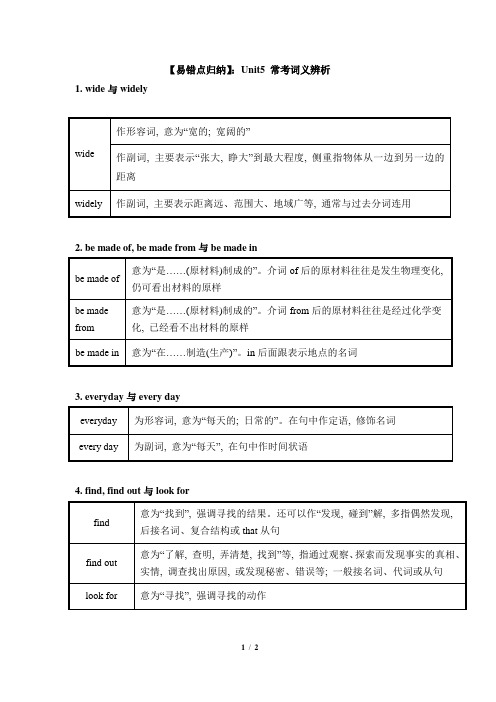
【易错点归纳】:Unit5 常考词义辨析1. wide 与widely2. be made of, be made from 与be made in be made of意为“是……(原材料)制成的”。
介词of 后的原材料往往是发生物理变化, 仍可看出材料的原样 be madefrom 意为“是……(原材料)制成的”。
介词from 后的原材料往往是经过化学变化, 已经看不出材料的原样be made in 意为“在……制造(生产)”。
in 后面跟表示地点的名词3. everyday 与every dayeveryday 为形容词, 意为“每天的; 日常的”。
在句中作定语, 修饰名词 every day 为副词, 意为“每天”, 在句中作时间状语4. find, find out 与look for find 意为“找到”, 强调寻找的结果。
还可以作“发现, 碰到”解, 多指偶然发现,后接名词、复合结构或that 从句find out 意为“了解, 查明, 弄清楚, 找到”等, 指通过观察、探索而发现事实的真相、实情, 调查找出原因, 或发现秘密、错误等; 一般接名词、代词或从句 look for意为“寻找”, 强调寻找的动作wide 作形容词, 意为“宽的; 宽阔的”作副词, 主要表示“张大, 睁大”到最大程度, 侧重指物体从一边到另一边的距离widely 作副词, 主要表示距离远、范围大、地域广等, 通常与过去分词连用5. compete, competitor与competitioncompete 动词, 意为“竞争, 对抗, 比赛”competitor 名词, 意为“参赛者, 竞争者”competition 名词, 意为“比赛, 竞争”6. heat与hotheat 作为名词时, 为不可数名词, 意思为“热; 高温”; 作动词时, 意思为“加热” hot 作为形容词, 意为“热的; 热情的; 辣的”。
widely的用法和短语

widely的用法和短语一、widely的基本用法在英语中,"widely"是一个常见的副词,表示广泛地或普遍地。
本文将介绍它的基本用法和相关短语,以帮助读者更好地理解并正确运用这个词。
1. 意思:"widely" 是由形容词 "wide" 加上 "-ly" 后缀构成的副词,意为“广泛地”。
它可用来修饰动词、形容词和副词等,在句子中起到限定、强调或修饰动作范围或程度的作用。
2. 位置:通常情况下, "widely" 放在动词之前或形容词/副词之后。
比如:- The news was widely reported.- She is widely regarded as one of the best scientists in her field.3. 句型/结构:在句子中, "widely" 可以出现在不同的句型和结构中。
以下是一些常见例子:A) 修饰动词:Widely 使用最频繁的方式就是修饰动词,表示某个行为被广泛地进行或传播。
- He is widely known for his charity work.- The book was widely read by young adults.B) 修饰形容词:"Widely" 能够修饰形容词,以强调或修饰形容词所描述的范围。
- This product is widely available in major stores.- Jane's performance was widely praised by the audience.C) 修饰副词:"Widely" 也可以修饰副词,表示某个行为在非常广泛的程度上进行。
- The rumor spread widely among the students.- She is widely known for her exceptional cooking skills.二、widely相关短语除了基本用法外, "widely" 还常与其他单词组合形成一些常用短语。
wide与widely用法的三点区别
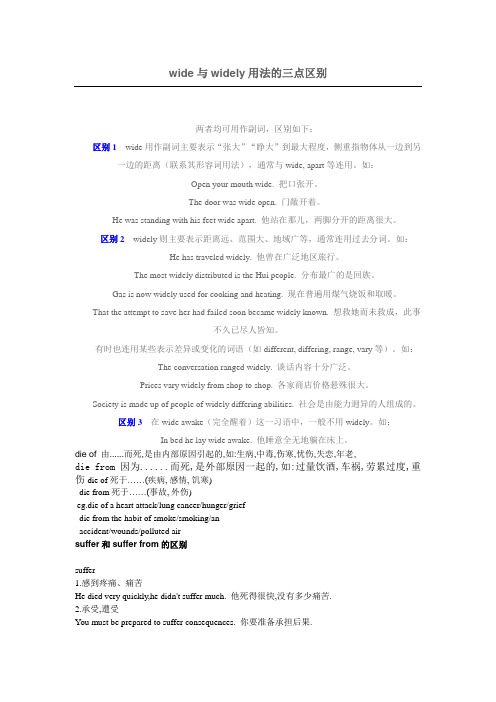
wide与widely用法的三点区别两者均可用作副词,区别如下:区别1 wide用作副词主要表示“张大”“睁大”到最大程度,侧重指物体从一边到另一边的距离(联系其形容词用法),通常与wide, apart等连用。
如:Open your mouth wide. 把口张开。
The door was wide open. 门敞开着。
He was standing with his feet wide apart. 他站在那儿,两脚分开的距离很大。
区别2 widely则主要表示距离远、范围大、地域广等,通常连用过去分词。
如:He has traveled widely. 他曾在广泛地区旅行。
The most widely distributed is the Hui people. 分布最广的是回族。
Gas is now widely used for cooking and heating. 现在普遍用煤气烧饭和取暖。
That the attempt to save her had failed soon became widely known. 想救她而未救成,此事不久已尽人皆知。
有时也连用某些表示差异或变化的词语(如different, differing, range, vary等)。
如:The conversation ranged widely. 谈话内容十分广泛。
Prices vary widely from shop to shop. 各家商店价格悬殊很大。
Society is made up of people of widely differing abilities. 社会是由能力迥异的人组成的。
区别3 在wide awake(完全醒着)这一习语中,一般不用widely。
如:In bed he lay wide awake. 他睡意全无地躺在床上。
die of 由......而死,是由内部原因引起的,如:生病,中毒,伤寒,忧伤,失恋,年老,die from因为......而死,是外部原因一起的,如:过量饮酒,车祸,劳累过度,重伤die of 死于……(疾病, 感情, 饥寒)die from 死于……(事故, 外伤)eg.die of a heart attack/lung cancer/hunger/griefdie from the habit of smoke/smoking/anaccident/wounds/polluted airsuffer和suffer from的区别suffer1.感到疼痛、痛苦He died very quickly,he didn't suffer much. 他死得很快,没有多少痛苦.2.承受,遭受You must be prepared to suffer consequences. 你要准备承担后果.suffer from1.患有(疾病等)She suffers from headache. 她患头痛病2.为...所苦,因...而吃苦头Our business has suffered from lack of investment. 我们的企业因缺乏投资而受苦.仅供个人用于学习、研究;不得用于商业用途。
几组易混副词的辨析
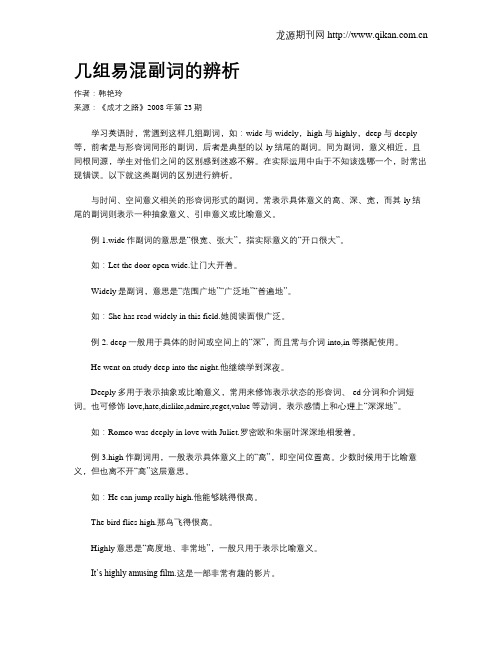
几组易混副词的辨析作者:韩艳玲来源:《成才之路》2008年第23期学习英语时,常遇到这样几组副词,如:wide与widely,high与highly,deep与deeply 等,前者是与形容词同形的副词,后者是典型的以-ly结尾的副词。
同为副词,意义相近,且同根同源,学生对他们之间的区别感到迷惑不解。
在实际运用中由于不知该选哪一个,时常出现错误。
以下就这类副词的区别进行辨析。
与时间、空间意义相关的形容词形式的副词,常表示具体意义的高、深、宽,而其-ly结尾的副词则表示一种抽象意义、引申意义或比喻意义。
例1.wide作副词的意思是“很宽、张大”,指实际意义的“开口很大”。
如:Let the door open wide.让门大开着。
Widely是副词,意思是“范围广地”“广泛地”“普遍地”。
如:She has read widely in this field.她阅读面很广泛。
例2. deep一般用于具体的时间或空间上的“深”,而且常与介词into,in等搭配使用。
He went on study deep into the night.他继续学到深夜。
Deeply多用于表示抽象或比喻意义,常用来修饰表示状态的形容词、-ed分词和介词短词。
也可修饰love,hate,dislike,admire,reget,value等动词,表示感情上和心理上“深深地”。
如:Romeo was deeply in love with Juliet.罗密欧和朱丽叶深深地相爱着。
例3.high作副词用,一般表示具体意义上的“高”,即空间位置高。
少数时候用于比喻意义,但也离不开“高”这层意思。
如:He can jump really high.他能够跳得很高。
The bird flies high.那鸟飞得很高。
Highly意思是“高度地、非常地”,一般只用于表示比喻意义。
It’s highly amusing film.这是一部非常有趣的影片。
wide和widely区别

wide和widely区别
wide和widely的区别:中文含义不同、词性不同、用法不同。
wide可作形容词、副词和名词,基本含义有“宽阔的”、“宽度为……的”、“广泛的”、“充分地”、“坏球”;widely只作副词,意思为“普遍地”、“很大程度上”。
一、wide的中文意思及用法介绍1、作为形容词时,意为宽的;宽阔的;……宽的;宽度为……的;大量的;广泛的;范围大的。
例句:Sam has a wide mouth.
萨姆有一张大嘴。
How wide is that stream?
那条小溪有多宽?
Her music appeals to a wide audience.
她的音乐吸引了大批的听众。
There are wide variations in prices.
价格的差別很大。
We are talking about education in its widest sense . 我们在讨论最广义的教育。
2、作为副词时,意为尽可能远地;充分地。
例句:The door was wide open .
门四敞大开。
He stood with his legs wide apart .
他站在那里,两腿叉開。
Open your mouth wide .
把嘴张大。
In a few seconds she was wide awake .
片刻之间她完全醒来。
She had a fear of wide-open spaces .
身处开阔的空地中会使她感到害怕。
3、作为名词时,意为(板球)歪球,坏球。
wide和widely的用法
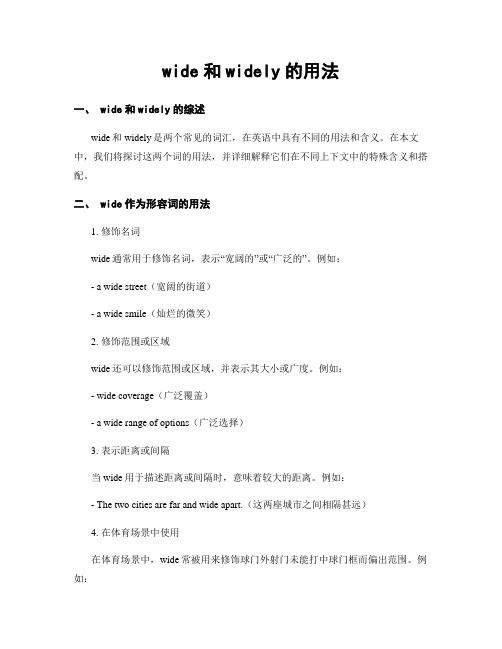
wide和widely的用法一、 wide和widely的综述wide和widely是两个常见的词汇,在英语中具有不同的用法和含义。
在本文中,我们将探讨这两个词的用法,并详细解释它们在不同上下文中的特殊含义和搭配。
二、 wide作为形容词的用法1. 修饰名词wide通常用于修饰名词,表示“宽阔的”或“广泛的”。
例如:- a wide street(宽阔的街道)- a wide smile(灿烂的微笑)2. 修饰范围或区域wide还可以修饰范围或区域,并表示其大小或广度。
例如:- wide coverage(广泛覆盖)- a wide range of options(广泛选择)3. 表示距离或间隔当wide用于描述距离或间隔时,意味着较大的距离。
例如:- The two cities are far and wide apart.(这两座城市之间相隔甚远)4. 在体育场景中使用在体育场景中,wide常被用来修饰球门外射门未能打中球门框而偏出范围。
例如:- The striker's shot went wide of the goal.(前锋射门没有打进球门框内)三、 widely作为副词的用法1. 描述广泛分布或流行widely用作副词时,通常表示某事物广泛分布或受到广泛关注。
例如:- This book is widely read.(这本书广受阅读)- English is widely spoken around the world.(英语在世界各地普遍使用)2. 描述行为方式widely也可以用来描述行为方式,指的是范围大、灵活多样。
例如:- Opinions on this matter are widely divided.(对于这个问题意见不一)3. 在新闻报道中常见widely经常出现在新闻报道中,表示某一事件或观点已经被广泛传播和引起了广泛的关注。
例如:- The news of their engagement was widely reported in the media.(他们订婚的消息在媒体上被广泛报道)四、wide和widely的搭配1. wide range ofwide range of意指“各种各样的”,可用于形容名词后面。
wide的用法总结大全2篇
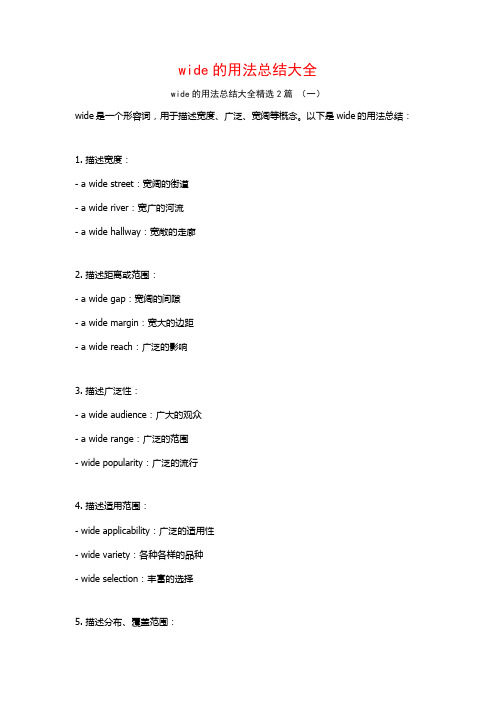
wide的用法总结大全wide的用法总结大全精选2篇(一)wide是一个形容词,用于描述宽度、广泛、宽阔等概念。
以下是wide的用法总结:1. 描述宽度:- a wide street:宽阔的街道- a wide river:宽广的河流- a wide hallway:宽敞的走廊2. 描述距离或范围:- a wide gap:宽阔的间隙- a wide margin:宽大的边距- a wide reach:广泛的影响3. 描述广泛性:- a wide audience:广大的观众- a wide range:广泛的范围- wide popularity:广泛的流行4. 描述适用范围:- wide applicability:广泛的适用性- wide variety:各种各样的品种- wide selection:丰富的选择5. 描述分布、覆盖范围:- wide distribution:广泛分布- wide coverage:广泛覆盖- a wide network:广泛的网络6. 描述态势或程度:- a wide lead:明显的领先- a wide gap:明显的差距- a wide difference:明显的差异7. 描述生物特征:- wide eyes:大大的眼睛- wide grin:开心的咧嘴笑8. 用作副词修饰动词:- open wide:张开(嘴巴、眼睛等)- spread wide:敞开请注意,这仅仅是wide的一些常见用法总结,具体用法还需要根据具体语境和句子结构进行判断。
wide的用法总结大全精选2篇(二)wild的用法总结如下:1. 形容词用法:- 表示野生的、未经驯养的:wild animals(野生动物)、wild flowers(野花)- 表示狂野的、放荡的:wild behavior(狂野的行为)、wild party(疯狂的聚会)- 表示狂热的、热情的:wild enthusiasm(热情洋溢)、wild applause(热烈的掌声)- 表示未加限制的、没有受约束的:wild imagination(丰富的想象力)、wild speculation(草率的猜测)2. 名词用法:- 指野外、荒野:in the wild(在野外)、wilderness(荒野)- 指野生动植物:protect the wild(保护野生动植物)、release into the wild(释放到野外)3. 副词用法:- 表示疯狂地、不受限制地:run wild(疯跑)、laugh wild(哈哈大笑)- 表示随意地、随性地:dress wild(穿得随便)、drive wild(驾驶狂妄)4. 动词用法:- 表示追逐、追赶:wild chase(疯狂追逐)- 表示使狂怒、失去控制:drive someone wild(使某人发狂)、go wild with anger (勃然大怒)- 表示放任、开放:wild camping(露营自由)、wild swimming(自由游泳)5. 短语和固定搭配:- go wild(发疯、发狂)- a wild goose chase(徒劳的追逐)- be wild about(对...疯狂喜爱)- run wild(失控、自由自在地奔跑)- set the world on fire(大放异彩、轰动全球)。
wide的用法及例句
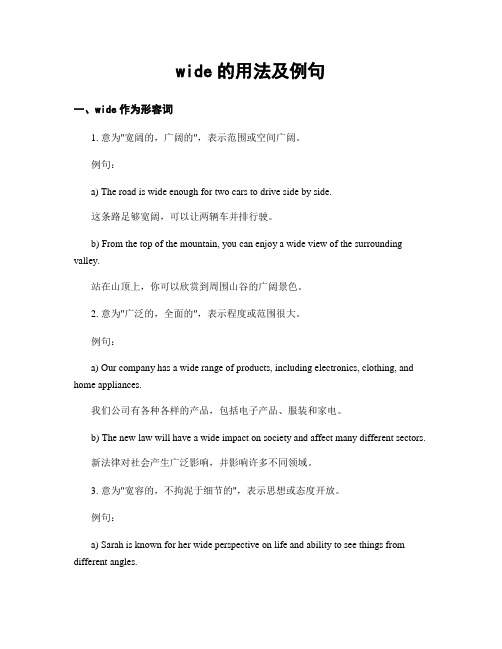
wide的用法及例句一、wide作为形容词1. 意为"宽阔的,广阔的",表示范围或空间广阔。
例句:a) The road is wide enough for two cars to drive side by side.这条路足够宽阔,可以让两辆车并排行驶。
b) From the top of the mountain, you can enjoy a wide view of the surrounding valley.站在山顶上,你可以欣赏到周围山谷的广阔景色。
2. 意为"广泛的,全面的",表示程度或范围很大。
例句:a) Our company has a wide range of products, including electronics, clothing, and home appliances.我们公司有各种各样的产品,包括电子产品、服装和家电。
b) The new law will have a wide impact on society and affect many different sectors.新法律对社会产生广泛影响,并影响许多不同领域。
3. 意为"宽容的,不拘泥于细节的",表示思想或态度开放。
例句:a) Sarah is known for her wide perspective on life and ability to see things from different angles.莎拉以其对生活持开放态度和能够从不同角度看问题的能力而闻名。
b) The new manager has a wide mindset and encourages creative thinking among employees.新经理具有开阔的思维方式,并鼓励员工进行创造性思考。
二、wide作为副词1. 意为"广泛地,深入地",常用来描述行动、探索或了解的范围。
wide 与 widely
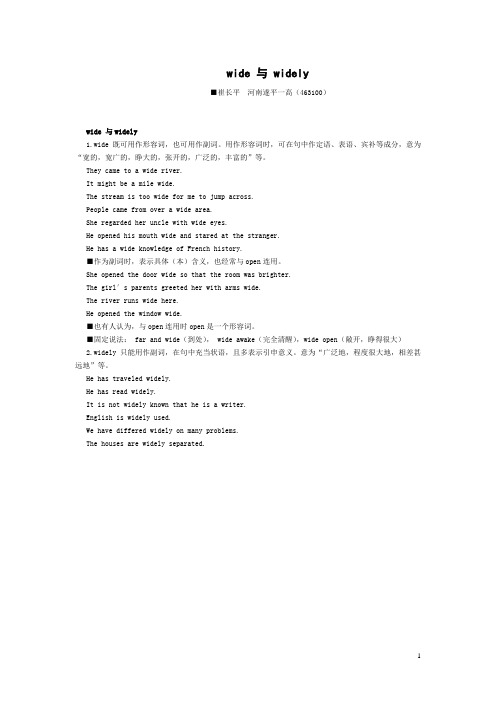
wide 与 widely■崔长平河南遂平一高(463100)wide 与widely1.wide既可用作形容词,也可用作副词。
用作形容词时,可在句中作定语、表语、宾补等成分,意为“宽的,宽广的,睁大的,张开的,广泛的,丰富的”等。
They came to a wide river.It might be a mile wide.The stream is too wide for me to jump across.People came from over a wide area.She regarded her uncle with wide eyes.He opened his mouth wide and stared at the stranger.He has a wide knowledge of French history.■作为副词时,表示具体(本)含义,也经常与open连用。
She opened the door wide so that the room was brighter.The girl′s parents greeted her with arms wide.The river runs wide here.He opened the window wide.■也有人认为,与open连用时open是一个形容词。
■固定说法: far and wide(到处), wide awake(完全清醒),wide open(敞开,睁得很大)2.widely 只能用作副词,在句中充当状语,且多表示引申意义。
意为“广泛地,程度很大地,相差甚远地”等。
He has traveled widely.He has read widely.It is not widely known that he is a writer.English is widely used.We have differed widely on many problems.The houses are widely separated.1。
wide和widely的用法
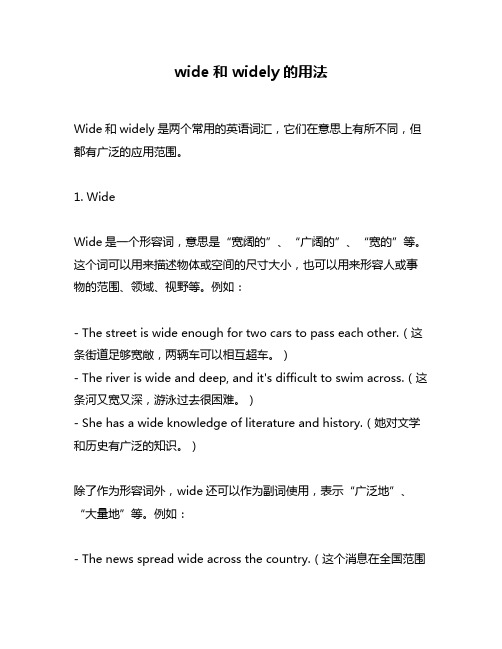
wide和widely的用法Wide和widely是两个常用的英语词汇,它们在意思上有所不同,但都有广泛的应用范围。
1. WideWide是一个形容词,意思是“宽阔的”、“广阔的”、“宽的”等。
这个词可以用来描述物体或空间的尺寸大小,也可以用来形容人或事物的范围、领域、视野等。
例如:- The street is wide enough for two cars to pass each other.(这条街道足够宽敞,两辆车可以相互超车。
)- The river is wide and deep, and it's difficult to swim across.(这条河又宽又深,游泳过去很困难。
)- She has a wide knowledge of literature and history.(她对文学和历史有广泛的知识。
)除了作为形容词外,wide还可以作为副词使用,表示“广泛地”、“大量地”等。
例如:- The news spread wide across the country.(这个消息在全国范围内迅速传开了。
)- He opened his arms wide and gave her a big hug.(他张开双臂给她一个大大的拥抱。
)2. WidelyWidely是一个副词,意思是“广泛地”、“普遍地”、“大量地”等。
这个词通常用来描述某种现象或情况在多大程度上普及、流行或被认可。
例如:- The book has been widely read and praised by critics.(这本书被广泛阅读,并受到评论家的好评。
)- English is widely spoken and understood all over the world.(英语在全世界范围内广泛使用和理解。
)- The new policy has been widely criticized by the public.(新政策受到了公众的广泛批评。
wide与broad的区别
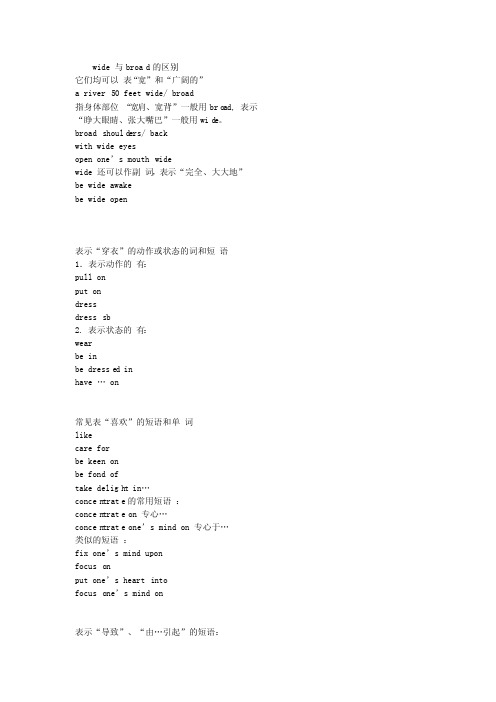
wide 与broad的区别它们均可以表“宽”和“广阔的”a river50 feet wide/ broad指身体部位“宽肩、宽背”一般用bro ad, 表示“睁大眼睛、张大嘴巴”一般用wid e。
broadshould ers/ backwith wide eyesopen one’s mouthwidewide 还可以作副词,表示“完全、大大地”be wide awakebe wide open表示“穿衣”的动作或状态的词和短语1.表示动作的有:pull onput ondressdresssb2. 表示状态的有:wearbe inbe dresse d inhave … on常见表“喜欢”的短语和单词likecare forbe keen onbe fond oftake deligh t in…concen trate的常用短语:concen trate on 专心…concen trate one’s mind on 专心于…类似的短语:fix one’s mind uponfocusonput one’s heartintofocusone’s mind on表示“导致”、“由…引起”的短语:1. 导致causesth. (to do)result inlead to2. 由……引起be caused byresult fromgrow out oflie in表“全力以赴”的短语:do / try one’s bestspareno effort s to dotake greatpainsto dogo all out to dodo what somebo dy can (do) to dodo all somebo dy can (do) to do“出了什么事”的几种不同表达What’s wrongwith….?What’s the matter with…?What’s the troubl e with…?What happen ed (to sb.) ?“众所周知”常用表达法:It is knownto all that…主语从句,that不能省As is knownto all,定语从句,置于句首We all know (that)后接宾语从句Everyo ne knows(that)后接宾语从句, whichis knownto all.非限定从句,置于句末表“同意某人意见”的常用短语:agreewith sb. /what sb. saidagreeto sth.approv e (of) sth.in favour of sth.be agreea ble to sth.be for sth.“不同意”disagr ee with sb./ what sb. saidobject to sth.disapp rove(of) sth.be agains t sth.wouldrather与 prefer的区别1.宁愿做……而不做……wouldrather do A than do Bprefer A to Bprefer to do A rather than do B2. wouldrather主语 + 过去式,表示“宁愿”eg. I wouldrather you came tomorr ow than today.should prefer sb. to do sth./ should prefer主语 + 过去式,表示“比较喜欢……”eg. I should prefer you not to go therealone.OR: I should prefer that you did not go therealone.supply, provid e, offer的区别:1.表示“向某人提供某物”supply / provid e sb. with sth.supply / provid e sth. for sb.supply sth. to sb.offersb. sth.2. 表示“主动提出做某事”offerto do sth.3. 表示“倘使”、“假如”provid ed / provid ing that= on condit ion that=only if4. 表示“满足需要”supply / meet a need.die of 与die from 的区别die of 表示“死于……病”或冻死、气死,或死于过度悲伤。
wide 的用法
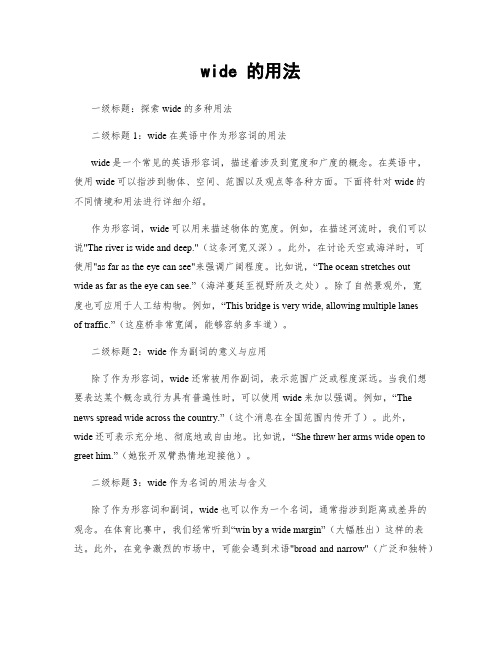
wide 的用法一级标题:探索wide的多种用法二级标题1:wide在英语中作为形容词的用法wide是一个常见的英语形容词,描述着涉及到宽度和广度的概念。
在英语中,使用wide可以指涉到物体、空间、范围以及观点等各种方面。
下面将针对wide的不同情境和用法进行详细介绍。
作为形容词,wide可以用来描述物体的宽度。
例如,在描述河流时,我们可以说"The river is wide and deep."(这条河宽又深)。
此外,在讨论天空或海洋时,可使用"as far as the eye can see"来强调广阔程度。
比如说,“The ocean stretches out wide as far as the eye can see.”(海洋蔓延至视野所及之处)。
除了自然景观外,宽度也可应用于人工结构物。
例如,“This bridge is very wide, allowing multiple lanesof traffic.”(这座桥非常宽阔,能够容纳多车道)。
二级标题2:wide作为副词的意义与应用除了作为形容词,wide还常被用作副词,表示范围广泛或程度深远。
当我们想要表达某个概念或行为具有普遍性时,可以使用wide来加以强调。
例如,“The news spread wide across the country.”(这个消息在全国范围内传开了)。
此外,wide还可表示充分地、彻底地或自由地。
比如说,“She threw her arms wide open to greet him.”(她张开双臂热情地迎接他)。
二级标题3:wide作为名词的用法与含义除了作为形容词和副词,wide也可以作为一个名词,通常指涉到距离或差异的观念。
在体育比赛中,我们经常听到“win by a wide margin”(大幅胜出)这样的表达。
此外,在竞争激烈的市场中,可能会遇到术语"broad and narrow"(广泛和独特)来描述市场定位。
wide的用法及短语
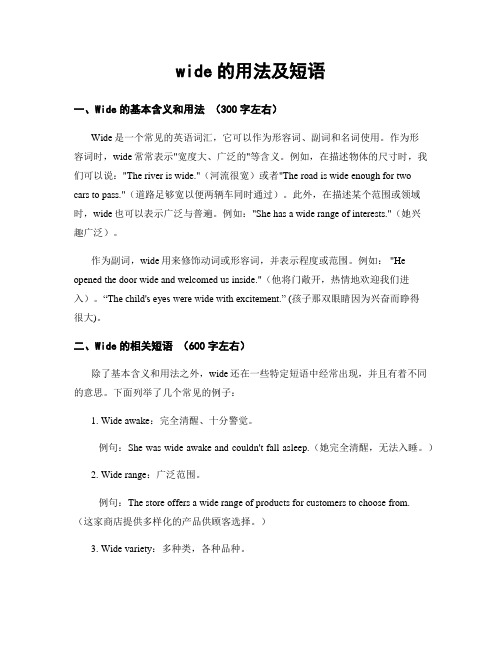
wide的用法及短语一、Wide的基本含义和用法(300字左右)Wide是一个常见的英语词汇,它可以作为形容词、副词和名词使用。
作为形容词时,wide常常表示"宽度大、广泛的"等含义。
例如,在描述物体的尺寸时,我们可以说:"The river is wide."(河流很宽)或者"The road is wide enough for twocars to pass."(道路足够宽以便两辆车同时通过)。
此外,在描述某个范围或领域时,wide也可以表示广泛与普遍。
例如:"She has a wide range of interests."(她兴趣广泛)。
作为副词,wide用来修饰动词或形容词,并表示程度或范围。
例如: "He opened the door wide and welcomed us inside."(他将门敞开,热情地欢迎我们进入)。
“The child's eyes were wide with excitement.” (孩子那双眼睛因为兴奋而睁得很大)。
二、Wide的相关短语(600字左右)除了基本含义和用法之外,wide还在一些特定短语中经常出现,并且有着不同的意思。
下面列举了几个常见的例子:1. Wide awake:完全清醒、十分警觉。
例句:She was wide awake and couldn't fall asleep.(她完全清醒,无法入睡。
)2. Wide range:广泛范围。
例句:The store offers a wide range of products for customers to choose from.(这家商店提供多样化的产品供顾客选择。
)3. Wide variety:多种类,各种品种。
例句:Our supermarket has a wide variety of fruits and vegetables.(我们超市有各种各样的水果和蔬菜)4. Wide spread:广泛传播、普及。
wide的用法
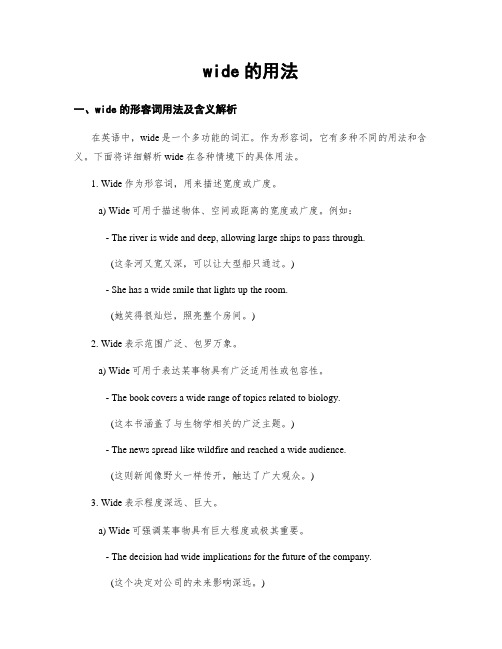
wide的用法一、wide的形容词用法及含义解析在英语中,wide是一个多功能的词汇。
作为形容词,它有多种不同的用法和含义。
下面将详细解析wide在各种情境下的具体用法。
1. Wide作为形容词,用来描述宽度或广度。
a) Wide可用于描述物体、空间或距离的宽度或广度。
例如:- The river is wide and deep, allowing large ships to pass through.(这条河又宽又深,可以让大型船只通过。
)- She has a wide smile that lights up the room.(她笑得很灿烂,照亮整个房间。
)2. Wide表示范围广泛、包罗万象。
a) Wide可用于表达某事物具有广泛适用性或包容性。
- The book covers a wide range of topics related to biology.(这本书涵盖了与生物学相关的广泛主题。
)- The news spread like wildfire and reached a wide audience.(这则新闻像野火一样传开,触达了广大观众。
)3. Wide表示程度深远、巨大。
a) Wide可强调某事物具有巨大程度或极其重要。
- The decision had wide implications for the future of the company.(这个决定对公司的未来影响深远。
)- The reforms had a wide-ranging impact on society.(这些改革对社会产生了广泛而深远的影响。
)4. Wide表示宽大、开阔心胸。
a) Wide可用于描述某人具有广阔的思想、心胸宽阔。
- He is a man with a wide perspective and open mind.(他是一个具有广泛视野和开放思想的人。
)- She has a wide understanding of different cultures and traditions.(她对不同的文化和传统有着广泛理解。
widely的用法和例句
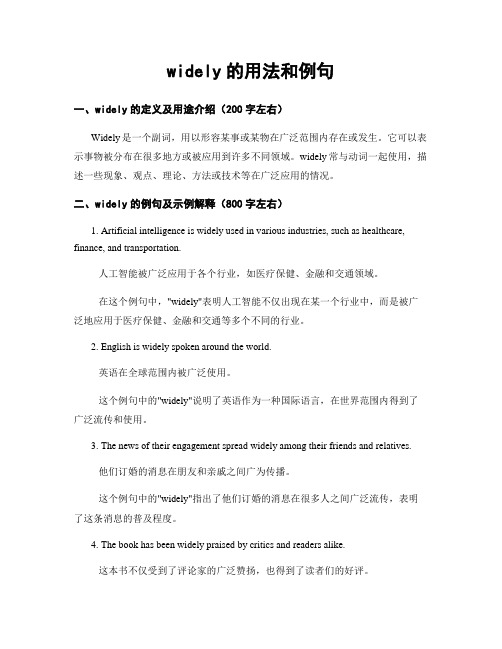
widely的用法和例句一、widely的定义及用途介绍(200字左右)Widely是一个副词,用以形容某事或某物在广泛范围内存在或发生。
它可以表示事物被分布在很多地方或被应用到许多不同领域。
widely常与动词一起使用,描述一些现象、观点、理论、方法或技术等在广泛应用的情况。
二、widely的例句及示例解释(800字左右)1. Artificial intelligence is widely used in various industries, such as healthcare, finance, and transportation.人工智能被广泛应用于各个行业,如医疗保健、金融和交通领域。
在这个例句中,"widely"表明人工智能不仅出现在某一个行业中,而是被广泛地应用于医疗保健、金融和交通等多个不同的行业。
2. English is widely spoken around the world.英语在全球范围内被广泛使用。
这个例句中的"widely"说明了英语作为一种国际语言,在世界范围内得到了广泛流传和使用。
3. The news of their engagement spread widely among their friends and relatives.他们订婚的消息在朋友和亲戚之间广为传播。
这个例句中的"widely"指出了他们订婚的消息在很多人之间广泛流传,表明了这条消息的普及程度。
4. The book has been widely praised by critics and readers alike.这本书不仅受到了评论家的广泛赞扬,也得到了读者们的好评。
"widely"表示这本书得到了评论家和读者的普遍好评,说明了这本书在不同群体中被广泛认可和赞赏。
5. Renewable energy sources are being widely adopted in an effort to reduce carbon emissions.为了减少碳排放量,可再生能源正在被广泛采用。
宽阔的,动词形容词副词
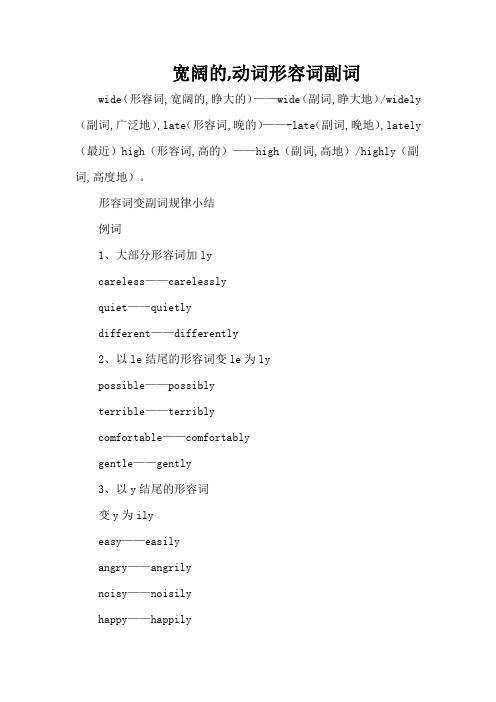
宽阔的,动词形容词副词wide(形容词,宽阔的,睁大的)——wide(副词,睁大地)/widely (副词,广泛地),late(形容词,晚的)——-late(副词,晚地),lately (最近)high(形容词,高的)——high(副词,高地)/highly(副词,高度地)。
形容词变副词规律小结例词1、大部分形容词加lycareless——carelesslyquiet——quietlydifferent——differently2、以le结尾的形容词变le为lypossible——possiblyterrible——terriblycomfortable——comfortablygentle——gently3、以y结尾的形容词变y为ilyeasy——easilyangry——angrilynoisy——noisilyhappy——happilyheavy——heavilyhealthy——healthily不规则变化本身既是形容词也是副词,无需改变fast——fastearly——earlyhigh——highhard——hardlate——latefar——farwide——widealone——alone形容词和副词为完全不同的单词good——well需要去掉字母e的单词。
true——truly虽然以ly结尾,但却是形容词,不能直接用来修饰动词。
friendlylivelylovelylonelyLikely有些形容词本身即为副词,同时也有加ly的副词形式。
但加不加ly意思不一样,使用时需注意。
wide(形容词,宽阔的,睁大的)——wide(副词,睁大地)/widely (副词,广泛地),late(形容词,晚的)——-late(副词,晚地),lately(最近)high(形容词,高的)——high(副词,高地)/highly(副词,高度地)特别容易犯错的副词形容词——-副词备注hard副词容易写成hardly,hardly意思为“几乎不”,与hard无任何关系不能用friendly直接修饰动词,只能改成in a friendly way“用一种友好的方式”。
期末复习——高频词汇用法及辨析鲁教版英语八年级下册
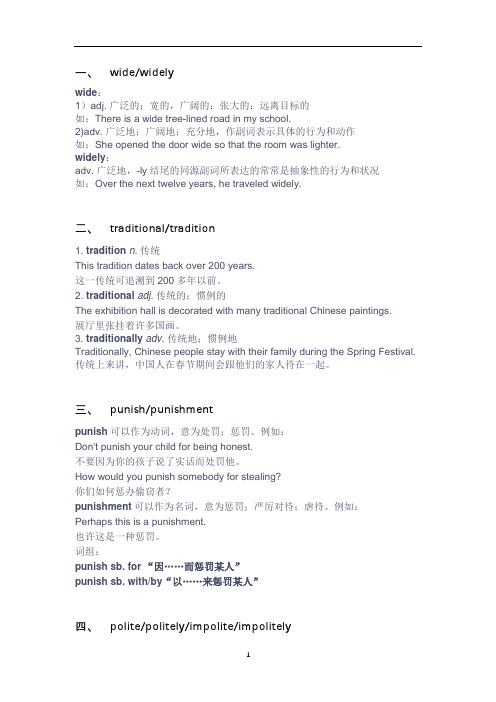
一、wide/widelywide:1)adj. 广泛的;宽的,广阔的;张大的;远离目标的如:There is a wide tree-lined road in my school.2)adv. 广泛地;广阔地;充分地,作副词表示具体的行为和动作如:She opened the door wide so that the room was lighter.widely:adv. 广泛地,-ly结尾的同源副词所表达的常常是抽象性的行为和状况如:Over the next twelve years, he traveled widely.二、traditional/tradition1. tradition n. 传统This tradition dates back over 200 years.这一传统可追溯到200多年以前。
2. traditional adj. 传统的;惯例的The exhibition hall is decorated with many traditional Chinese paintings.展厅里张挂着许多国画。
3. traditionally adv. 传统地;惯例地Traditionally, Chinese people stay with their family during the Spring Festival. 传统上来讲,中国人在春节期间会跟他们的家人待在一起。
三、punish/punishmentpunish可以作为动词,意为处罚;惩罚。
例如:Don't punish your child for being honest.不要因为你的孩子说了实话而处罚他。
How would you punish somebody for stealing?你们如何惩办偷窃者?punishment可以作为名词,意为惩罚;严厉对待;虐待。
例如:Perhaps this is a punishment.也许这是一种惩罚。
- 1、下载文档前请自行甄别文档内容的完整性,平台不提供额外的编辑、内容补充、找答案等附加服务。
- 2、"仅部分预览"的文档,不可在线预览部分如存在完整性等问题,可反馈申请退款(可完整预览的文档不适用该条件!)。
- 3、如文档侵犯您的权益,请联系客服反馈,我们会尽快为您处理(人工客服工作时间:9:00-18:30)。
2019年6月英语四级语法用法辨析:wide与widely的用法区别英语四级语法用法辨析:wide与widely的用法区别
两者均可用作副词,区别如下:
区别1 wide用作副词主要表示张大睁大到最大程度,侧重指物体从一边到另一边的距离(联系其形容词用法),通常与wide, apart等连用。
如:
Open your mouth wide. 把口张开。
The door was wide open. 门敞开着。
He was standing with his feet wide apart. 他站在那儿,两脚分开的距离很大。
区别2 widely则主要表示距离远、范围大、地域广等,通常连用过去分词。
如:
He has traveled widely. 他曾在广泛地区旅行。
The most widely distributed is the Hui people. 分布最广的是回族。
Gas is now widely used for cooking and heating. 现在普遍用煤气烧饭和取暖。
That the attempt to save her had failed soon became widely known. 想救她而未救成,此事不久已尽人皆知。
有时也连用某些表示差异或变化的词语(如different, differing, range, vary等)。
如:
The conversation ranged widely. 谈话内容十分广泛。
Prices vary widely from shop to shop. 各家商店价格悬殊很大。
Society is made up of people of widely differing abilities. 社会是由能力迥异的人组成的。
区别 3 在wide awake(完全醒着)这一习语中,一般不用widely。
如:
In bed he lay wide awake. 他睡意全无地躺在床上。
